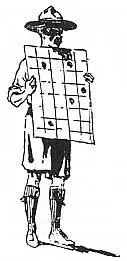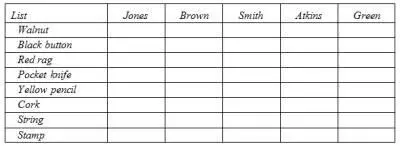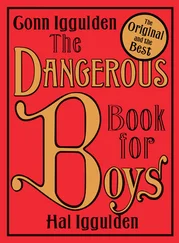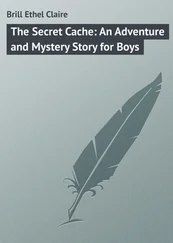Robert Robert - Scouting for Boys
Здесь есть возможность читать онлайн «Robert Robert - Scouting for Boys» весь текст электронной книги совершенно бесплатно (целиком полную версию без сокращений). В некоторых случаях можно слушать аудио, скачать через торрент в формате fb2 и присутствует краткое содержание. Жанр: Старинная литература, und. Описание произведения, (предисловие) а так же отзывы посетителей доступны на портале библиотеки ЛибКат.
- Название:Scouting for Boys
- Автор:
- Жанр:
- Год:неизвестен
- ISBN:нет данных
- Рейтинг книги:3 / 5. Голосов: 1
-
Избранное:Добавить в избранное
- Отзывы:
-
Ваша оценка:
- 60
- 1
- 2
- 3
- 4
- 5
Scouting for Boys: краткое содержание, описание и аннотация
Предлагаем к чтению аннотацию, описание, краткое содержание или предисловие (зависит от того, что написал сам автор книги «Scouting for Boys»). Если вы не нашли необходимую информацию о книге — напишите в комментариях, мы постараемся отыскать её.
Scouting for Boys — читать онлайн бесплатно полную книгу (весь текст) целиком
Ниже представлен текст книги, разбитый по страницам. Система сохранения места последней прочитанной страницы, позволяет с удобством читать онлайн бесплатно книгу «Scouting for Boys», без необходимости каждый раз заново искать на чём Вы остановились. Поставьте закладку, и сможете в любой момент перейти на страницу, на которой закончили чтение.
Интервал:
Закладка:
———
Make the Scouts learn for themselves to notice and remember the whereabouts of all fire alarms, police points, hospitals, etc.
———
IN THE COUNTRY: Take the Patrol out for a walk and teach the boys to notice distant prominent features as landmarks, such as hills, church steeples, and the like, and as nearer landmarks such things as peculiar buildings, trees, rocks, gates, etc. Also have them notice by-roads or paths, different kinds of trees, birds, animals, tracks, and also people and vehicles.
———
Send the boys out on a walk. On their return examine them one by one, or have them all in and let them write their ans wers on, say, six questions which you give them with reference to certain points which they should have noticed. It adds to the value of the practice if you make certain small marks in the ground beforehand, or leave buttons or matches, etc., for the boys to notice or to pick up and bring in, as a means of making them examine the ground close to them, as well as distant objects.
———
At Troop meeting, arrange for an “incident” to take place without warning, such as this: A man rus hes in, “knocks down” the Scoutmaster, and escapes. Then each Patrol writes a report of what happened, a description of the man, etc.
GAMES IN OBSERVATION
Send the Patrol out of the room.
Thimble Finding
(Indoors)
Take a thimble, ring, coin, bit of paper, or any small article, and place it where it is perfectly visible, but in a spot where it is not likely to be noticed. Let the Patrol come in and look for it. When one of the Scout sees it, he should go and quietly sit down without indicating to the others where it is.
After a fair time he should be told to point it out to those who have not succeeded in finding it.
Far and Near
(For town or country)
Umpire goes along a given road or line of country with a Patrol in patrolling formation. He carries a scoring card with the name of each Scout on it.
Each Scout looks out for the details required, and, directly he notices one, he runs to the umpire and informs him or hands in the article, if it is an article he finds. The umpire enters a mark accordingly against his name. The Scout who gains most marks in the walk wins.
Details like the following should be chosen, to develop the Scout’s observation and to encourage him to look far and near, up and down. The details should be varied every time the game is played; and about eight or ten should be given at a time.
Every match found................................1 point
Every button found ...............................1 point
Bird’s tracks .........................................2 points
Grey horse seen....................................2 points
Pigeon flying........................................2 points
Sparrow sitting .....................................1 point
Ash tree ...............................................2 points
Broken window ....................................1 point
(And so on)
Shop Window
(Outdoors in town)
Umpire takes a Patrol down a street past six shops and gives them half a minute at each shop. Then, after moving them off to some distance, he gives each boy a pencil and card, and tells him to write from memory what he noticed in, say, the third and fifth shops. The Scout who sets down most articles correctly wins. It is useful practice to match one boy against another in heats—the losers competing again, till you arrive at the worst. This gives the worst Scouts the most practice.
Room Observation
(Indoors)
Send each Scout in turn into a room for half a minute. When he comes out, take down a list of furniture and articles which he has noticed. The boy who notices most wins.
The simplest way of scoring is to make a list of the articles in the room on your scoring paper, with a column against them for marks for each Scout. The marks can then easily be totalled up.

“Old Spotty-Face” is a good game for practising observation. It also helps to sharpen the eye sight.
Old Spotty-face
Prepare squares of cardboard divided into about a dozen or more small squares. Each Scout should take one, and should have a pencil and go off a few hundred yards.
The leader then takes a large sheet of cardboard, with the same number of squares ruled on it of about three inch sides. The leader has a number of black paper discs, half an inch in diameter, and pins ready, and sticks about half a dozen on to his
card, dotted about where he likes. He holds up his card so that it can be seen by the
Scouts. They then gradually approach, and as they get within sight they mark their cards with the same pattern of spots. The one who does so at the farthest distance from the leader wins.
Give five points for every spot correctly shown, deduct one point for every two inches nearer than the furthest man.
Smugglers over the Border
The “border” is a certain line of country about four hundred yards long, preferably a road or wide path or bit of sand, on which foot-tracks can easily be seen. One Patrol watches the border with sentries posted along this road; with a reserve posted farther inland, about half-way between the “border” and the “town”. The “town” would be a base marked by a tree, building, or flags, about half a mile distant from the border. A hostile Patrol of smugglers assembles about half a mile on the other side of the border. They will all cross the border, in any formation they please, either singly or together or scattered, and make for the town, either walking or running, or at Scout Pace. Only one among them is supposed to be smuggling, and he wears tracking irons. The sentries walk up and down their beat (they may not run till after the “alarm”), waiting for the tracks of the smuggler. Directly a sentry sees the track, he gives the alarm signal to the reserve and starts himself to follow up the track as fast as he can. The reserve thereupon co-operates with him and they all try to catch the smuggler before he can reach the town. Once within the boundary of the town he is safe and wins the game.
Kim’s Game
Place about twenty or thirty s mall articles on a tray, or on the table or floor, such as two or three different kinds of buttons, pencils, corks, rags, nuts, stones, knives, string, photos—anything you can find—and cover them over with a cloth or coat.
Make a list of these, and make a column opposite the list for each boy’s replies. Like this:

Then uncover the articles for one minute by your watch, or while you count slowly to sixty. Then cover them again.
Take each boy separately and let him whisper to you each of the articles that he can remember—or have him write a list of them—and mark them off on your scoring sheet.
The boy who remembers the greatest number wins the game.
Fugitives
Each Scout in the Patrol has a round disc of white cardboard with a number printed plainly upon it, pinned on to the back of his shirt.
One member of the Patrol is then chosen as the “fugitive”, while the rest act as hunters.
The “fugitive”, who wears tracking-irons, or leaves some kind of trail behind him, is given, say, ten minutes’ start. The rest of the Patrol then start out and endeavour to track him down.
Читать дальшеИнтервал:
Закладка:
Похожие книги на «Scouting for Boys»
Представляем Вашему вниманию похожие книги на «Scouting for Boys» списком для выбора. Мы отобрали схожую по названию и смыслу литературу в надежде предоставить читателям больше вариантов отыскать новые, интересные, ещё непрочитанные произведения.
Обсуждение, отзывы о книге «Scouting for Boys» и просто собственные мнения читателей. Оставьте ваши комментарии, напишите, что Вы думаете о произведении, его смысле или главных героях. Укажите что конкретно понравилось, а что нет, и почему Вы так считаете.

![Роберт Баден-Пауэлл - Искусство скаута-разведчика[Scouting for boys ; Искусство Разведки для мальчиков]](/books/70572/robert-baden-pauell-iskusstvo-skauta-thumb.webp)









